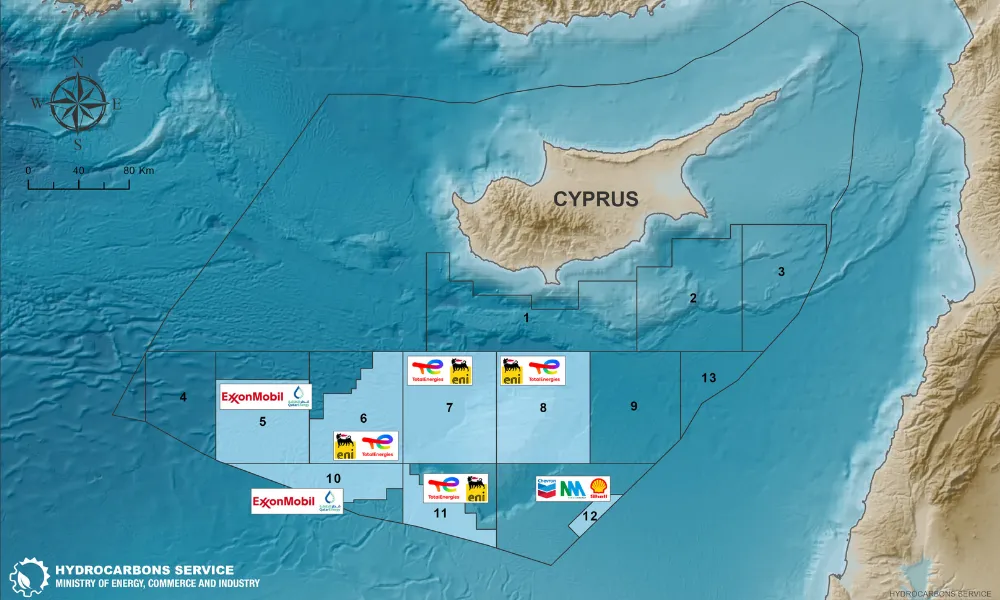Italian energy giant Eni took a significant step forward in developing its Cronos gas find in Block 6 of Cyprus’ exclusive economic zone after signing three commercial agreements at the Eastern Mediterranean Energy Conference (EMC) in Limassol last week.
According to Middle East Economic Survey (MEES), the target remains getting first gas to market in 2027, but with a final investment decision (FID) still pending, the industry publication suggests 2028 appears more realistic.
MEES reports that three deals were signed last Monday at the EMC relating to development of the 3.1 trillion cubic feet (tcf) Cronos field.
Although Cronos was only discovered in 2022, it is on track to commercial development at a much faster pace than Cyprus’ first gas find – Chevron’s 3.5tcf Aphrodite reservoir, discovered in 2011 in Block 12.
Export routes, fees and infrastructure determined
The latest Limassol accords give Cronos a clear export route, defined fees, and dedicated infrastructure to turn the Block 6 discovery into commercial deliveries.
The deals signed cover:
· a handling, transportation and processing agreement (HTPA) between Eni (50%, operator), its Block 6 partner French major TotalEnergies (50%), Egyptian state firm EGAS, Eni’s Egypt subsidiary (IEOC) and Petrobel;
· a tolling contract signed by Eni, TotalEnergies and the Damietta liquefied natural gas (LNG) export plant in Egypt; and
· a tariff agreement between the Block 6 partners and Egypt’s Petroleum Ministry.
According to MEES, Cronos gas will flow via Egypt’s offshore network – using one of two pipelines developed for its Zohr gas discovery – into Zohr’s onshore facilities in Egypt for treatment. From there, a new pipeline will send gas directly to the Damietta LNG facility, bypassing Egypt’s grid.
The tolling and tariff agreements will regulate the fees for liquefaction of Cronos gas at Damietta and secure the necessary approvals to utilise Egyptian infrastructure.
Commercially, MEES reports the tolling fee at just under or just over $1 per million British thermal units (MMBtu), depending on quantity, and the tariff at under $0.5/MMBtu. The signing, delayed for last-minute edits, ultimately proceeded in the presence of Egyptian Petroleum Minister Karim Badawi and Cyprus Energy Minister George Papanastasiou.
The configuration underscores competing pressures. Egypt, now a net LNG importer, wants gas for its tight domestic market, yet Eni and TotalEnergies intend to export most Cronos volumes via the Damietta LNG facility. MEES notes the optics could prove politically awkward for Cairo – exporting LNG from Damietta while also importing LNG for domestic needs.
Changing East Med landscape
Cyprus, through its minister, hailed the agreements as another milestone toward monetising its EEZ, while Egypt’s Badawi described it as a “major step which has changed the landscape of the Eastern Mediterranean”.
Eni’s Head of North Africa Martina Opizzi said the company was signing detailed agreements “needed to ensure that all the stakeholders are aligned on the path towards a final investment decision.” Eni is working hard to ensure that “the project will fly in a fast-track manner,” she added.
The next steps towards realising Cyprus’ first gas, as Cyprus’ energy ministry sees it, is for Eni and Total to file a development and production plan and then take the all-important final investment decision by year’s end.
Eni executives cast Cronos as the “first brick” in a broader cross-Mediterranean development linking Europe and Africa. Meanwhile, Block 6 also contains the Zeus discovery (2–3 tcf) made in 2022 and the 2019 Calypso find (1 tcf).
MEES reports that the potential for synergies with nearby fields could also extend to US giant ExxonMobil’s Block 10, which holds the 3.2tcf Glaucus discovery from 2018 and this year’s Pegasus discovery at around 5tcf.
